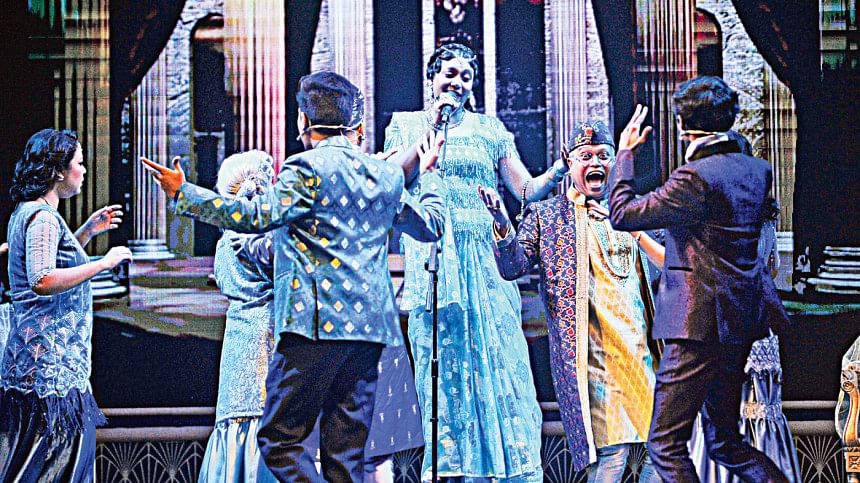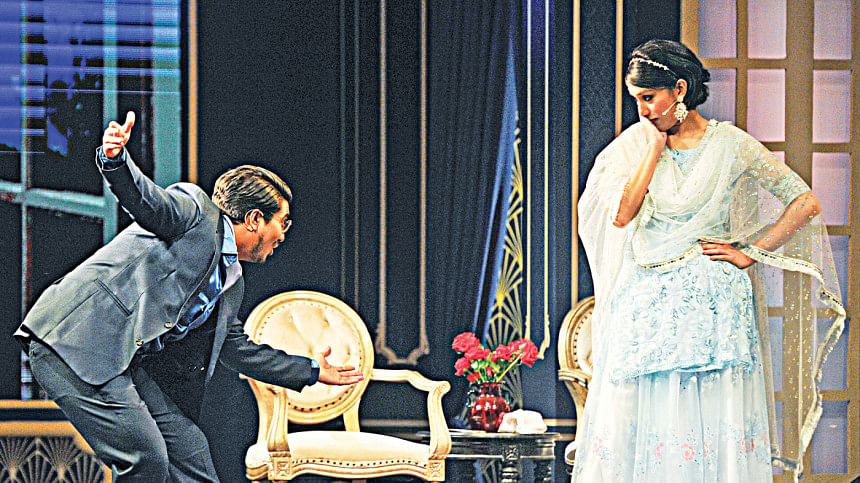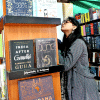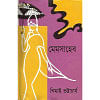‘Begum’s Blunder’ shines in Wilde splendour

Begum's Blunder is a clever adaptation of Oscar Wilde's Lady Windermere's Fan. The play transports the Victorian setting to the imaginary Behrampur, the heyday of the Nawabs in India. With Naila Azad Nupur's direction, and Sadaf Saaz working her behind-the-scenes magic as the producer, the production by Kaleidoscope projects lights on the prism of Wilde's 1892 play to find their contemporary refractions and reflections in colonial India.
The play reminds the Dhaka audience that the gossip-mongering Victorian upper class, with their deceitful moral stance, is no different from their own. Human behaviours are uncannily the same across time and space, making Wilde our contemporary. The proximity is further heightened by the choice of location and the ambience created for the staging. The immersive theatrical experience, which was performed at Aloki in the upscale part of town before a select upper-class audience, has a fourth wall effect. The cabaret-style seating at the venue became an extension of the stage where the main action takes place.
The characters join the birthday party of the protagonist, Begum Mumtaz Nizamuddin (i.e., Lady Windermere), through the aisle that divides the audience. The herald announces their names, and the characters enter the stage, interacting with the audience, who, in turn, have become extensions of the attendees. The set design and choreography provide a backdrop against which the drama unfolds. The immediate intimacy between the audience and the characters highlights the central theme of the play: the manipulation of appearances to navigate societal expectations. The plot pivots around a disgraced character, Amirun Nahar Khatun (i.e., Mrs. Erlynne), who is trying to buy her way into her former society through deceptions. Almost all of the characters in the play are unaware of her motives. This irony serves as a piston that propels the narrative story forward.
The play more of less retains the original dialogue, with changes primarily in the names of characters and places. It would be almost sacrilegious for any script writer to try to tweak Wilde's texts. Wilde's crunchy dialogues often feel like nuts in a nutrient bar that mixes love with betrayal and righteousness with common sense under the masks we wear in society. Naila Azad was smart to leave Wilde's words alone, as they have the reputation of being an omnibus of quotable quotes. However, the script does use vernacular languages to authenticate its adapted location. The play's seamless transition between Hindi, Bangla, and English serves as a reminder of its adopted location. The inclusion of western songs and classical dance, as well as the use of a digital backdrop, creates a party mood that is in contrast to the storm that the central character is facing, thinking that her husband, Nawab Nizamuddin, is having an affair with an older woman, Amirun.
The director, however, took some poetic licence to appropriate some of the contextual references. She transforms Lady Windermere's titular fan into a shawl for Begum Mumtaz, a gift from her husband. The change is not superficial; it remains pivotal to the plot of societal intrigue.
The director, however, took some poetic licence to appropriate some of the contextual references. She transforms Lady Windermere's titular fan into a shawl for Begum Mumtaz, a gift from her husband. The change is not superficial; it remains pivotal to the plot of societal intrigue. Visually, as a stage prop, the shawl is much more effective for the characters dressed in traditional Indian dresses. It is a deft nod to local customs and aesthetics.
The satirical comedy has many private jokes. One such joke involves the characterisation of Nawab Mahiuddin Zafar, who comes from Dhaka. His counterpart in the main text is Mr. Hopper, who comes from Australia. For the snooty society of Grosvenor Square in London, colonised Australia is still a place infested with "flying kangaroos." One only hopes that Dhaka's slighting in this analogy was not deliberate.

The most notable aspect of the play is the professionalism displayed by a group of brilliant amateur performers. Their superb acting and almost flawless enunciation have given the play its elan. The cast delivers their lines with a finesse that captures the cultural and contextual nuances of Wilde's play. The transition between scenes is seamless, a testament to the hard work that has gone into its making.
The producer Sadaf Saaz mentions that Kaleidoscope, a BHN Experiences venture created with Jatrik and with support from Asiatic EXP, is a multidimensional platform that wants to elevate the experience of theatre, the arts, and more. Jatrik, responsible for organising massive events such as Dhaka Lit Fest, has always strived to create a creative space that nurtures local talents. Begum's Blunder's actors come from a diverse range of backgrounds, and it was the director's brilliance that brought out the best in the characters by highlighting their uniqueness and peculiarities as part of the drama's overall effect. Jatrik will stage the play for seven more shows at the Mohila Samity in the coming weeks. The grandiose immersive effect that Aloki offered in its premier show is likely to be missed at the other venue. Nevertheless, kudos to Kaleidoscope for bringing Oscar Wilde's wit and wisdom to the Dhaka stage, as well as for offering a delightful evening of theatre that is both thought-provoking and entertaining.
Dr Shamsad Mortuza is a professor of English at Dhaka University, and former pro-vice-chancellor of the University of Liberal Arts Bangladesh (ULAB).

 For all latest news, follow The Daily Star's Google News channel.
For all latest news, follow The Daily Star's Google News channel. 







Comments